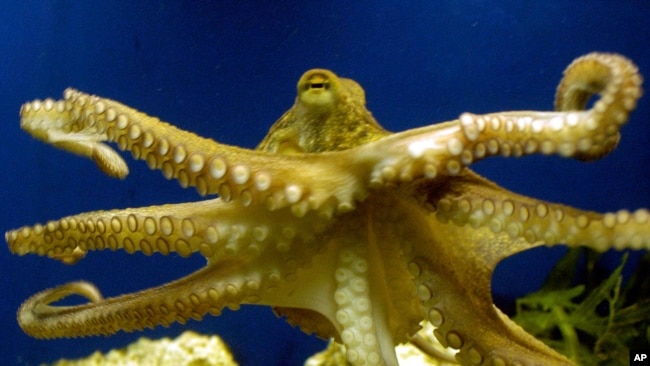ひとつの化石からいろんなことが明らかになる、面白いですね。
ワクワクします!!
VOAで英語を学び、古代に思いを馳せましょう!!
研究成果 :タコの祖先は恐竜より前に生息していた(和訳)
Study: Octopus Ancestors Lived Before Dinosaurs
March 12, 2022
科学者によると、タコの最古の祖先の化石から、この動物が恐竜より前に生息していたことが示唆されたと言います。
この化石は約3億3千万年前のものと推定され、現在のアメリカ西部のモンタナ州で発見されました。
この化石は1988年にカナダのロイヤル・オンタリオ博物館に寄贈されました。しかし、科学者たちが同じ場所で見つかった他の化石を研究していたため、この化石は長い間重要な発見とは見なされていませんでした。
しかし、ある研究者がこの化石が動物の多くの手足を示していることを発見し、さらに研究を進めるようになったのです。
12cmの化石には10本の手足があり、それぞれに2列の吸盤(suckers)がついています。現代のタコの手足は8本です。科学者たちは、この古代生物は浅い海域に生息していた可能性が高いとしています。
この化石は、タコが科学者が考えているよりも何百万年も早く生息していたことを示唆している、と研究者は言います。つまり、タコは恐竜より前に進化した動物ということになります。
研究チームは、この研究成果をNature Communications誌に発表しました。
マイク・ベッキオーネ氏はAP通信に対し、「軟組織の化石が見つかるのは、ごく一部の場所を除いて非常に珍しいことです」と語っています。同氏はスミソニアン国立自然史博物館の動物学者で、今回の研究には関与していません。「これは非常に興味深い発見であり、これまで知られていたよりもはるかに先祖遠くに押し戻した」とベッキオーネは言います。
クリストファー・ウォーレン氏は、ニューヨークのアメリカ自然史博物館の科学者で、この研究の共同執筆者です。彼はAP通信に、保存状態の良い化石は、古代のタコが現代のタコと同様に、捕食者から隠れるために暗い液体を放出する能力を持っていた証拠を示していると話します。
研究者によれば、この生物はvampyropodと呼ばれ、現代のタコやvampire squidの祖先であった可能性が高いとのことです。このような生物は、イカよりもタコに似ています。
同チームによれば、これまで、”確定的な最古の”vampyropod は約2億4000万年前に生息していたと考えられていたとのことです。
研究チームはこの化石をジョー・バイデン米大統領にちなんでSyllipsimopodi bideniと命名しました。バイデン氏の科学・研究政策に敬意を表してこの名前にしたといいます。
Study: Octopus Ancestors Lived Before Dinosaurs
Scientists say a fossil of the oldest known octopus ancestor suggests that the animal lived before the dinosaurs.
The researchers have estimated the fossil is about 330 million years old. It was discovered in what is now the western American state of Montana.
The fossil was donated to Canada’s Royal Ontario Museum in 1988. But it was not considered an important find for many years as scientists studied other fossils found at the same site.
But then some researchers discovered that the fossil showed the many limbs of an animal and began to study it further.
The 12-centimeter fossil has 10 limbs, each with two rows of suckers. Modern octopuses have eight limbs. The scientists say the ancient creature likely lived in shallow ocean areas.
The researchers say the fossil suggests that octopuses lived millions of years earlier than scientists believed. This means that the animals developed before the dinosaurs.
The team recently reported its findings in the publication Nature Communications.
“It's very rare to find soft tissue fossils, except in a few places,” Mike Vecchione told The Associated Press. He is a zoologist with the Smithsonian National Museum of Natural History who was not involved in the study. “This is a very exciting finding. It pushes back the ancestry much farther than previously known," Vecchione said.
Christopher Whalen is a scientist with the American Museum of Natural History in New York City. He was a co-writer of the study. He told the AP the well-preserved fossil showed evidence that the ancient octopus had the ability to release a dark liquid to help it hide from predators, just like modern octopuses.
The creature, known as a vampyropod, was likely the ancestor of both modern octopuses and vampire squid, the researchers said. Such creatures are more similar to an octopus than a squid.
The team said until now, the “oldest known definitive” vampyropod was believed to have lived around 240 million years ago.
The scientists named the fossil Syllipsimopodi bideni, after American President Joe Biden. They said they decided on the name to show respect for Biden’s science and research policies.
Words in This Story
fossil – n. part of an animal or plant that lived a long time ago that has been preserved in rock
limb – n. the arm or leg of a person or animal
sucker – n. an organ that some animals use to hold or stick to something
shallow – adj. not deep
preserve – v. keep something the same or prevent it from being damaged or destroyed
predator – n. an animal that hunts and kills other animals for food
definitive – adj. certain and not likely to change
